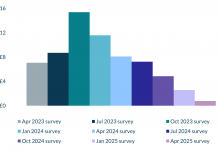 Profits are up at Telecom Plus, the group that owns multi-utility provider Utility Warehouse. Selling its 20% stake in Opus Energy to Drax boosted returns by £62.3m.
Profits are up at Telecom Plus, the group that owns multi-utility provider Utility Warehouse. Selling its 20% stake in Opus Energy to Drax boosted returns by £62.3m.
The group posted broadly flat overall revenues (-0.6% to £740.3m) citing lower energy prices as a contributor. Adjusted profit before tax (continuing operations) was up 9.1% to £53.3m. Statutory profit before tax (continuing operations) increased 16.5% to £40.9m.
The Opus sale took total post tax profit to £95m, up 199% on £31.8m the previous year.
The company said it was confident of increasing its both its members (currently 600,000) and its service numbers (2.3m) by 5%-10% this year.
Meanwhile, CEO Andrew Lindsay said the firm’s “wholesale arrangements and retail pricing structure will help to shelter us from the impact of the proposed price cap, compared with other major suppliers”.
The firm went further, with chairman Charles Wigoder welcoming proposals for an ‘absolute’ price cap.
“Whilst the timing of implementation, the level at which the cap would be set, and the specific details of whom it would affect are unclear, we strongly welcome this proposal as we believe it will create a fairer energy market and make it more difficult for suppliers with large legacy bases to use the profits they are earning from disengaged customers to fund cheap introductory deals to those who are switching,” he said.
“Whilst the gap between SVTs and the cheapest introductory deals is likely to narrow, the market will remain highly competitive, and there are many suppliers who will be unaffected by the proposed price cap who will be able to continue offering attractive tariffs to those looking to switch.”
Wigoder also warned of further small suppliers going bust, following the demise of GB Energy last winter. He pointed out that while the Big Six energy firms manage to maintain or increase profit despite losing customers to independent suppliers, those independents are largely gaining market share by making “significant losses”.
“All of these market participants are reliant on the same wholesale costs and use similar distribution channels (namely price comparison sites and bulk switching initiatives) to attract customers who generally choose their new supplier based predominantly on price and, in many cases, will switch again as soon as they reach the end of their introductory fixed-price period,” said Wigoder.
“And although new suppliers enjoy a significant initial cost advantage by being exempt from certain policy costs, these cease to apply as they gain scale. We find it difficult to understand how in the face of these market dynamics, this multitude of sub-scale competitors can develop a viable long-term business model.”
The chairman used his statement to urge government not to give up on domestic water competition and to reduce the burden that policies and “unrealistic deadlines” place on market participants.
Wigoder also slammed the CMA proposal around a ‘database of the disengaged’ to be “fundamentally misconceived in believing [it] will achieve anything other than greater bureaucracy, more costs and increased confusion.” It should be scrapped, he said.
Meanwhile, the company has rolled out 100,000 smart meters. Wigoder though fingered its former meter operator (mop) as hampering the rollout due to “persistent failure” to meet agreed service levels. He said performance had improved under the new mop.
Related stories:
Bristol Energy seeks to reassure customers after ‘irresponsible’ GB Energy goes bust
Tempus Energy shuts supply business
Drax to buy business energy supplier Opus for £340m
Put ‘troubled’ smart meter rollout on hold, urges IoD
Eon calls for harder line on smart meters
SSE urges smart meter rethink as costs spiral and benefits tank
Ofgem mulls what to do if people don’t engage with smart meters
Smart meter rollout nears 6m – will 2020 deadline soften?
Dumb decisions: MPs blast smart meter programme
Follow us at @EnergystMedia. For regular bulletins, sign up for the free newsletter.



